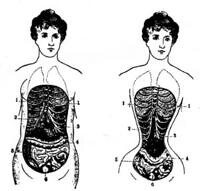 I first noticed my bad breathing habits when i went scuba diving. When everyone was ready to emerge, having depleted their tank of air, i still had half a tank left. I also notice that my reaction to someone disrupting me working on my computer is to take a deep breath. Do i breathe when i’m virtual? I certainly don’t remember to eat, pee or blink so i kinda doubt it.
I first noticed my bad breathing habits when i went scuba diving. When everyone was ready to emerge, having depleted their tank of air, i still had half a tank left. I also notice that my reaction to someone disrupting me working on my computer is to take a deep breath. Do i breathe when i’m virtual? I certainly don’t remember to eat, pee or blink so i kinda doubt it.
All of this made me absolutely fascinated with Kelly McGonigal’s The Politics of Breathing: Still Liberating Women, After All These Years? I wonder if the computer is my contemporary corset….

Computer apnea??
or a meditative state?
Seems like your way of breathing put you in a stronger position than the other scuba divers at the end of the dive. But not being relaxed when you’re underwater is pretty risky. Funny, the experience made you tense, but that tension potentially allowed you to prolong the tension. There’s a word for that, but I forget what it is.
The diaphragm is where we tend to store a great deal of stress. Along with your heart, it’s probably your most imporant muscle. The way you breathe affects your whole body and mind — the flow of oxygen to your brain and to your muscles, the expulsion of carbon dioxide. When I took a week-long qi-gong class I found that the shorter my breaths were, the more my eyes focused on things closer to me, and the more relaxed and deep my breaths were, the more my eyes drifted out into the distance, towards the horizon.
One of the things I really miss about diving is how breath becomes a key part of physical movement; fuller lungs move you up, emptier lungs move you down, and not just subtly but dramatically. By just aiming fins and breathing right (glide up for awhile, down for awhile, like vertical tacking/coming about) you can even swim w/o kicking, the way hawks ride air currents and just steer.
Your breath and that of other divers becomes visible and audible, and you have to keep track of how much air you have left. All of that makes you very conscious of breathing patterns down there.
Three things that are clear to me: 1) calm, relaxed divers consume far less air than confused or scared or even mildly upset divers (jellyfish-stung Sean/lost Sean/sick Sean gulps twice+ as much air as standard-dive Sean.) 2) deep breathers tend to use noticeably less air than shallow breathers, NOT the other way around (deep vs. shallow is readily visible/audible underwater, and you can spot fear/trouble in a person when their breaths become shorter and faster) and 3) yes, women tend to consume substantially less air than men.
Less air consumption is not necessarily a bad thing. Of course corsets were grotesque and surely they unhealthily constrained and altered breathing patterns. But I wouldn’t consider your use of less air than your divemates a sign of “bad” breathing habits. It might be a sign of good breathing habits.
Bad? When you breathe at half the rate of everyone else?!?!?!?! I’d say that’s fantastic. Then again, my work involves me SCUBA diving, and the longer I can stay underwater, the more work I can get done. I’ve managed to reduce my air usage by about 1/4 over 10 years, I think, but I wish I could breathe like you! HA!